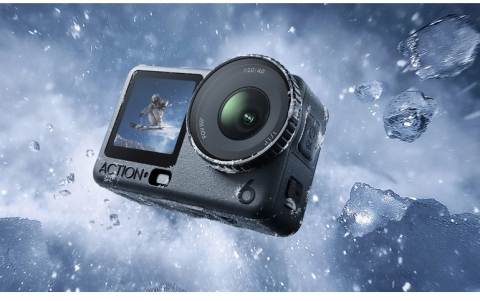
Warner Gets a Jump on Film Pirates in China
In a groundbreaking response to movie piracy, Warner Bros. Entertainment released its latest film on DVD in China the same day it debuted in U.S. theaters.
The goal for Warner is to battle rampant piracy in China by giving movie fans a legitimate alternative to bootlegs. But the boldness of Warner's action, which it took last week with no fanfare, was tempered by its choice of movie: "The Sisterhood of the Traveling Pants," a relatively low-budget film that the studio had not planned on releasing in Chinese theaters.
Nevertheless, several industry executives said they believed it was the first time a major U.S. studio had taken a movie scheduled for a wide-scale theatrical run and released it simultaneously on DVD in another country.
"It's a necessary move," said movie industry analyst Tom Adams of Adams Media Research. "It's obviously not as good as having control of the Chinese market, but it's about the next best thing that you can do."
Craig M. Hoffman, a spokesman for Warner Bros.' anti-piracy efforts, said the studio was not necessarily looking to apply the same strategy to combat bootlegging in the U.S. or other countries.
"That region presents, if you will, the 'perfect storm' of piracy," Hoffman said, noting that Chinese pirates do not have to contend with the government quotas and review boards that restrict Hollywood's access to the market. "This region needed something like this to see if [a] legitimate product could compete under these conditions."
The Motion Picture Assn. of America contends that the major studios lose more than $3.5 billion about 18% of last year's revenue from feature films annually to disc and videotape bootleggers, plus an undetermined amount to online movie swappers. The MPAA has responded by conducting more raids and seizures against bootleggers, but studio executives have also stressed the need to compete with pirates in the marketplace particularly overseas.
According to an April report by the U.S. trade representative, at least 90% of virtually every type of copyrighted work sold in China is counterfeit. China has only about 2,500 screens and 1.3 billion people, and the Chinese government allows only a few U.S. movies to be exhibited there. Most of the studios' movies reach Chinese viewers only on disc or videotape, which usually arrive months after the movie had its premiere in U.S. theaters.
Bootleggers in China face no such shortages or delays they can download illicitly recorded copies of almost any movie within days of its U.S. premiere, then burn those copies onto discs. As a result, Chinese movie fans typically buy pirated versions long before legitimate versions of the films become available.
Warner's accelerated release of the "Pants" DVD in China appears to have beaten the pirates to the market, but it could backfire globally. Bootleggers could use the Chinese DVDs to create high-quality copies that spread quickly around the world, either over the Internet or as counterfeit discs.
Hoping to make unauthorized copies of "Pants" less appealing outside China, Warner included no extra features on the DVD. It also added Mandarin subtitles that cannot be hidden, said Yotam Ben-Ami, an anti-piracy executive at the studio.
Executives at other studios argued that Warner was not taking much of a gamble. The potential market in China and among pirates is small for a "chick flick" like "Pants," which follows four young women who take turns wearing a single pair of jeans that magically fits their different sizes. The movie grossed $9.8 million in its opening weekend at U.S. theaters.
As of Wednesday, no copies of the "Pants" DVD were reported on two websites that track the arrival of bootlegged movies online. Nor were there any versions of the movie that had been recorded illicitly in U.S. theaters.
Even a low-risk movie can provide some insights into the market, though, and particularly into the way customers respond to the early availability of legitimate products. Those lessons could prove valuable in other countries with high piracy rates, such as Russia and much of Southeast Asia.
"We will closely monitor the impact of this release on our other businesses to determine whether to follow this same release strategy with more high-profile titles," said Jim Cardwell, president of Warner Home Video.
The major studios' strategy of delaying home video releases until months after a movie's premiere has guaranteed pirates an exclusive window of sorts. Until the official DVD and VHS release, the only version of a movie available for viewing at home is a pirated one.
Some independent production companies, including Mark Cuban and Todd Wagner's 2929 Entertainment and Morgan Freeman and Lori McCreary's Revelations Entertainment, plan to release movies online or on DVD at the same time as they reach theaters. But even though the major Hollywood studios have been releasing DVDs closer to the theatrical premiere, Adams said, he doubted that they would ever put them out at the same time.
"That would be silly," Adams said. "People are still going and buying several billion tickets a year, and it's that exposure and word of mouth that drives the DVD payday."
And the DVD payday is the one that really counts. Adams said home video sales and rentals accounted for 60% of the U.S. revenue for feature films last year, while ticket sales accounted for only 23%.
Warner Bros. has been unusually aggressive in its efforts to crack the huge Chinese market. Last fall it began manufacturing DVDs there in a joint venture with a Chinese partner, and it opened a state-of-the-art multiplex in 2002.
Suggested retail prices for the locally produced discs start at 22 yuan, or about $2.65. Still, these discs are more expensive than bootleggers' wares, which sell for about 60 cents, and they often are released no sooner than U.S. DVDs, which come out about five months after the movie makes its debut in theaters.
Other studios have tried different strategies in China.
In December, Sony Pictures released "Kung Fu Hustle," a Chinese-made film, to Chinese theaters. In February, a mere 45 days later, it released the film on DVD in China. Sony did not release the film to U.S. theaters until April.
The studio sold nearly 2 million of the deeply discounted Chinese discs, which was "a record result," said Ben Feingold, president of Sony Pictures Home Entertainment. Sales were boosted by "a massive anti-piracy effort" that was actively supported by the Chinese government, he said.
"A historical way to deal with the pirate market is to put in legitimate [products] at slightly over the piracy price and hope that people will convert," Feingold said, adding, "On Asian pictures, it really pays to be in the local market first, and to get the DVD up fast, and then release it in the United States and other markets."
Nevertheless, several industry executives said they believed it was the first time a major U.S. studio had taken a movie scheduled for a wide-scale theatrical run and released it simultaneously on DVD in another country.
"It's a necessary move," said movie industry analyst Tom Adams of Adams Media Research. "It's obviously not as good as having control of the Chinese market, but it's about the next best thing that you can do."
Craig M. Hoffman, a spokesman for Warner Bros.' anti-piracy efforts, said the studio was not necessarily looking to apply the same strategy to combat bootlegging in the U.S. or other countries.
"That region presents, if you will, the 'perfect storm' of piracy," Hoffman said, noting that Chinese pirates do not have to contend with the government quotas and review boards that restrict Hollywood's access to the market. "This region needed something like this to see if [a] legitimate product could compete under these conditions."
The Motion Picture Assn. of America contends that the major studios lose more than $3.5 billion about 18% of last year's revenue from feature films annually to disc and videotape bootleggers, plus an undetermined amount to online movie swappers. The MPAA has responded by conducting more raids and seizures against bootleggers, but studio executives have also stressed the need to compete with pirates in the marketplace particularly overseas.
According to an April report by the U.S. trade representative, at least 90% of virtually every type of copyrighted work sold in China is counterfeit. China has only about 2,500 screens and 1.3 billion people, and the Chinese government allows only a few U.S. movies to be exhibited there. Most of the studios' movies reach Chinese viewers only on disc or videotape, which usually arrive months after the movie had its premiere in U.S. theaters.
Bootleggers in China face no such shortages or delays they can download illicitly recorded copies of almost any movie within days of its U.S. premiere, then burn those copies onto discs. As a result, Chinese movie fans typically buy pirated versions long before legitimate versions of the films become available.
Warner's accelerated release of the "Pants" DVD in China appears to have beaten the pirates to the market, but it could backfire globally. Bootleggers could use the Chinese DVDs to create high-quality copies that spread quickly around the world, either over the Internet or as counterfeit discs.
Hoping to make unauthorized copies of "Pants" less appealing outside China, Warner included no extra features on the DVD. It also added Mandarin subtitles that cannot be hidden, said Yotam Ben-Ami, an anti-piracy executive at the studio.
Executives at other studios argued that Warner was not taking much of a gamble. The potential market in China and among pirates is small for a "chick flick" like "Pants," which follows four young women who take turns wearing a single pair of jeans that magically fits their different sizes. The movie grossed $9.8 million in its opening weekend at U.S. theaters.
As of Wednesday, no copies of the "Pants" DVD were reported on two websites that track the arrival of bootlegged movies online. Nor were there any versions of the movie that had been recorded illicitly in U.S. theaters.
Even a low-risk movie can provide some insights into the market, though, and particularly into the way customers respond to the early availability of legitimate products. Those lessons could prove valuable in other countries with high piracy rates, such as Russia and much of Southeast Asia.
"We will closely monitor the impact of this release on our other businesses to determine whether to follow this same release strategy with more high-profile titles," said Jim Cardwell, president of Warner Home Video.
The major studios' strategy of delaying home video releases until months after a movie's premiere has guaranteed pirates an exclusive window of sorts. Until the official DVD and VHS release, the only version of a movie available for viewing at home is a pirated one.
Some independent production companies, including Mark Cuban and Todd Wagner's 2929 Entertainment and Morgan Freeman and Lori McCreary's Revelations Entertainment, plan to release movies online or on DVD at the same time as they reach theaters. But even though the major Hollywood studios have been releasing DVDs closer to the theatrical premiere, Adams said, he doubted that they would ever put them out at the same time.
"That would be silly," Adams said. "People are still going and buying several billion tickets a year, and it's that exposure and word of mouth that drives the DVD payday."
And the DVD payday is the one that really counts. Adams said home video sales and rentals accounted for 60% of the U.S. revenue for feature films last year, while ticket sales accounted for only 23%.
Warner Bros. has been unusually aggressive in its efforts to crack the huge Chinese market. Last fall it began manufacturing DVDs there in a joint venture with a Chinese partner, and it opened a state-of-the-art multiplex in 2002.
Suggested retail prices for the locally produced discs start at 22 yuan, or about $2.65. Still, these discs are more expensive than bootleggers' wares, which sell for about 60 cents, and they often are released no sooner than U.S. DVDs, which come out about five months after the movie makes its debut in theaters.
Other studios have tried different strategies in China.
In December, Sony Pictures released "Kung Fu Hustle," a Chinese-made film, to Chinese theaters. In February, a mere 45 days later, it released the film on DVD in China. Sony did not release the film to U.S. theaters until April.
The studio sold nearly 2 million of the deeply discounted Chinese discs, which was "a record result," said Ben Feingold, president of Sony Pictures Home Entertainment. Sales were boosted by "a massive anti-piracy effort" that was actively supported by the Chinese government, he said.
"A historical way to deal with the pirate market is to put in legitimate [products] at slightly over the piracy price and hope that people will convert," Feingold said, adding, "On Asian pictures, it really pays to be in the local market first, and to get the DVD up fast, and then release it in the United States and other markets."





















